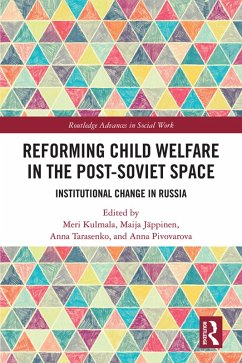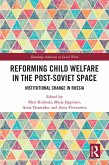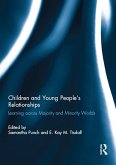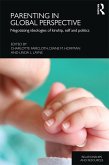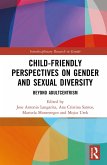Reforming Child Welfare in the Post-Soviet Space (eBook, PDF)
Institutional Change in Russia
Redaktion: Kulmala, Meri; Pivovarova, Anna; Tarasenko, Anna; Jäppinen, Maija
40,95 €
40,95 €
inkl. MwSt.
Sofort per Download lieferbar

20 °P sammeln
40,95 €
Als Download kaufen

40,95 €
inkl. MwSt.
Sofort per Download lieferbar

20 °P sammeln
Jetzt verschenken
Alle Infos zum eBook verschenken
40,95 €
inkl. MwSt.
Sofort per Download lieferbar
Alle Infos zum eBook verschenken

20 °P sammeln
Reforming Child Welfare in the Post-Soviet Space (eBook, PDF)
Institutional Change in Russia
Redaktion: Kulmala, Meri; Pivovarova, Anna; Tarasenko, Anna; Jäppinen, Maija
- Format: PDF
- Merkliste
- Auf die Merkliste
- Bewerten Bewerten
- Teilen
- Produkt teilen
- Produkterinnerung
- Produkterinnerung

Bitte loggen Sie sich zunächst in Ihr Kundenkonto ein oder registrieren Sie sich bei
bücher.de, um das eBook-Abo tolino select nutzen zu können.
Hier können Sie sich einloggen
Hier können Sie sich einloggen
Sie sind bereits eingeloggt. Klicken Sie auf 2. tolino select Abo, um fortzufahren.

Bitte loggen Sie sich zunächst in Ihr Kundenkonto ein oder registrieren Sie sich bei bücher.de, um das eBook-Abo tolino select nutzen zu können.
This book provides new and empirically grounded research-based knowledge and insights into the current transformation of the Russian child welfare system.
- Geräte: PC
- mit Kopierschutz
- eBook Hilfe
Andere Kunden interessierten sich auch für
![Reforming Child Welfare in the Post-Soviet Space (eBook, ePUB) Reforming Child Welfare in the Post-Soviet Space (eBook, ePUB)]() Reforming Child Welfare in the Post-Soviet Space (eBook, ePUB)40,95 €
Reforming Child Welfare in the Post-Soviet Space (eBook, ePUB)40,95 €![Vietnam And The Soviet Union (eBook, PDF) Vietnam And The Soviet Union (eBook, PDF)]() Douglas PikeVietnam And The Soviet Union (eBook, PDF)52,95 €
Douglas PikeVietnam And The Soviet Union (eBook, PDF)52,95 €![Children and Young People's Relationships (eBook, PDF) Children and Young People's Relationships (eBook, PDF)]() Children and Young People's Relationships (eBook, PDF)42,95 €
Children and Young People's Relationships (eBook, PDF)42,95 €![Parenting in Global Perspective (eBook, PDF) Parenting in Global Perspective (eBook, PDF)]() Parenting in Global Perspective (eBook, PDF)51,95 €
Parenting in Global Perspective (eBook, PDF)51,95 €![Muslims of Post-Communist Eurasia (eBook, PDF) Muslims of Post-Communist Eurasia (eBook, PDF)]() Muslims of Post-Communist Eurasia (eBook, PDF)42,95 €
Muslims of Post-Communist Eurasia (eBook, PDF)42,95 €![Child-Friendly Perspectives on Gender and Sexual Diversity (eBook, PDF) Child-Friendly Perspectives on Gender and Sexual Diversity (eBook, PDF)]() Child-Friendly Perspectives on Gender and Sexual Diversity (eBook, PDF)42,95 €
Child-Friendly Perspectives on Gender and Sexual Diversity (eBook, PDF)42,95 €![Children, Place and Identity (eBook, PDF) Children, Place and Identity (eBook, PDF)]() Jonathan ScourfieldChildren, Place and Identity (eBook, PDF)52,95 €
Jonathan ScourfieldChildren, Place and Identity (eBook, PDF)52,95 €-
-
-
This book provides new and empirically grounded research-based knowledge and insights into the current transformation of the Russian child welfare system.
Dieser Download kann aus rechtlichen Gründen nur mit Rechnungsadresse in A, B, BG, CY, CZ, D, DK, EW, E, FIN, F, GR, HR, H, IRL, I, LT, L, LR, M, NL, PL, P, R, S, SLO, SK ausgeliefert werden.
Produktdetails
- Produktdetails
- Verlag: Taylor & Francis eBooks
- Seitenzahl: 252
- Erscheinungstermin: 24. September 2020
- Englisch
- ISBN-13: 9781000193589
- Artikelnr.: 59929893
- Verlag: Taylor & Francis eBooks
- Seitenzahl: 252
- Erscheinungstermin: 24. September 2020
- Englisch
- ISBN-13: 9781000193589
- Artikelnr.: 59929893
- Herstellerkennzeichnung Die Herstellerinformationen sind derzeit nicht verfügbar.
Meri Kulmala holds a PhD in sociology and works as a university researcher and research coordinator of the Helsinki Inequality Initiative (INEQ) in the Faculty of Social Sciences at University of Helsinki, Finland. She works and publishes on issues of post-socialist welfare state and civil society development, women's activism, family and child welfare policy and feminist research methods. She leads an international interdisciplinary research project on child welfare in Russia and is involved in a project exploring youth well-being in the Arctic region, with her focus being on the well-being of young care leavers, which she studies principally through participatory research methods. Maija Jäppinen holds a PhD in social work and works as both a university lecturer in the Faculty of Social Sciences in University of Helsinki and a postdoctoral researcher in the Åbo Akademi University, Finland. Her research interests include Russian studies, gender violence, child welfare, social work practice research, social work with migrants, power asymmetries in social work encounters, migrant citizenisation, and human rights. Methodologically, she specialises in ethnographic research, qualitative research in different kinds of transnational settings, and feminist methodology. Anna Tarasenko holds a PhD in political science. Her current research focuses on the non-profit sector development in Russia. She has accomplished empirical research on various types of non-profits and their involvement in social service provision as well as engagement in interest representation in contemporary Russia. She has worked as a researcher in several international research projects, including the UNRISD research project 'New Directions in Social Policy: Alternatives from and for the Global South'and the international research project based at the University of Helsinki entitled 'A Child's Right to a Family: Deinstitutionalisation of Child Welfare in Putin's Russia'. Anna Pivovarova is a social anthropologist working on parenting, childhood and kinship. She holds a master's degree in anthropology from the European University at St. Petersburg and works as a doctoral researcher at the University of Helsinki focusing on adoptive and foster parenthood in today Russia. She has conducted research and published on modern home birth practice and independent midwifery, and participated in research projects on maternity healthcare, child welfare and alternative family care in Russia. Her research interests include medical anthropology, new kinship studies, narrative analysis, invented traditions, rituals and modern folklore.
Part 1: Introduction. 1. Introduction: Russian Child Welfare Reform and
Institutional Change. Part 2: Changing Numbers, Shifting Discourses. 2.
Statistics on the Deinstitutionalization of Child Welfare in Russia. 3. The
'Last-minute Children': Where did they come from, where will they go? Media
Portrayals of Children Deprived of Parental care 2006-2018. Part 3:
Transforming Institutions. 4. The Ideal (Re)organization of Care: Child
Welfare Reform as a Battlefield over Resources and Recognition. 5.
Institutional Variety rather than the End of Residential Care: Regional
Responses to Deinstitutionalisation Reform in Russia. 6. 'One has to Stop
Chasing Numbers!' The Unintended Consequences of Russian Child Welfare
Reform. Part 4: Foster And Birth Families Under Institutional Change. 7.
'Making' a Family: The Motives and Practices of Foster Parenting. 8. No
Longer Parents or Parents in Need of Support? Views of Child Welfare
Experts on Birth Parents. Part 5: Children In Care: Social Adaptation And
Aftercare. 9. The Successful Transition to Foster Care: The Child's
Perspective. 10. Young Adults Leaving Care: Agency and Educational Choice.
Part 6: Conclusions. 11. In Conclusion: The Fragmented Implementation of
the New Child Welfare Policy
Institutional Change. Part 2: Changing Numbers, Shifting Discourses. 2.
Statistics on the Deinstitutionalization of Child Welfare in Russia. 3. The
'Last-minute Children': Where did they come from, where will they go? Media
Portrayals of Children Deprived of Parental care 2006-2018. Part 3:
Transforming Institutions. 4. The Ideal (Re)organization of Care: Child
Welfare Reform as a Battlefield over Resources and Recognition. 5.
Institutional Variety rather than the End of Residential Care: Regional
Responses to Deinstitutionalisation Reform in Russia. 6. 'One has to Stop
Chasing Numbers!' The Unintended Consequences of Russian Child Welfare
Reform. Part 4: Foster And Birth Families Under Institutional Change. 7.
'Making' a Family: The Motives and Practices of Foster Parenting. 8. No
Longer Parents or Parents in Need of Support? Views of Child Welfare
Experts on Birth Parents. Part 5: Children In Care: Social Adaptation And
Aftercare. 9. The Successful Transition to Foster Care: The Child's
Perspective. 10. Young Adults Leaving Care: Agency and Educational Choice.
Part 6: Conclusions. 11. In Conclusion: The Fragmented Implementation of
the New Child Welfare Policy
Part 1: Introduction. 1. Introduction: Russian Child Welfare Reform and
Institutional Change. Part 2: Changing Numbers, Shifting Discourses. 2.
Statistics on the Deinstitutionalization of Child Welfare in Russia. 3. The
'Last-minute Children': Where did they come from, where will they go? Media
Portrayals of Children Deprived of Parental care 2006-2018. Part 3:
Transforming Institutions. 4. The Ideal (Re)organization of Care: Child
Welfare Reform as a Battlefield over Resources and Recognition. 5.
Institutional Variety rather than the End of Residential Care: Regional
Responses to Deinstitutionalisation Reform in Russia. 6. 'One has to Stop
Chasing Numbers!' The Unintended Consequences of Russian Child Welfare
Reform. Part 4: Foster And Birth Families Under Institutional Change. 7.
'Making' a Family: The Motives and Practices of Foster Parenting. 8. No
Longer Parents or Parents in Need of Support? Views of Child Welfare
Experts on Birth Parents. Part 5: Children In Care: Social Adaptation And
Aftercare. 9. The Successful Transition to Foster Care: The Child's
Perspective. 10. Young Adults Leaving Care: Agency and Educational Choice.
Part 6: Conclusions. 11. In Conclusion: The Fragmented Implementation of
the New Child Welfare Policy
Institutional Change. Part 2: Changing Numbers, Shifting Discourses. 2.
Statistics on the Deinstitutionalization of Child Welfare in Russia. 3. The
'Last-minute Children': Where did they come from, where will they go? Media
Portrayals of Children Deprived of Parental care 2006-2018. Part 3:
Transforming Institutions. 4. The Ideal (Re)organization of Care: Child
Welfare Reform as a Battlefield over Resources and Recognition. 5.
Institutional Variety rather than the End of Residential Care: Regional
Responses to Deinstitutionalisation Reform in Russia. 6. 'One has to Stop
Chasing Numbers!' The Unintended Consequences of Russian Child Welfare
Reform. Part 4: Foster And Birth Families Under Institutional Change. 7.
'Making' a Family: The Motives and Practices of Foster Parenting. 8. No
Longer Parents or Parents in Need of Support? Views of Child Welfare
Experts on Birth Parents. Part 5: Children In Care: Social Adaptation And
Aftercare. 9. The Successful Transition to Foster Care: The Child's
Perspective. 10. Young Adults Leaving Care: Agency and Educational Choice.
Part 6: Conclusions. 11. In Conclusion: The Fragmented Implementation of
the New Child Welfare Policy
